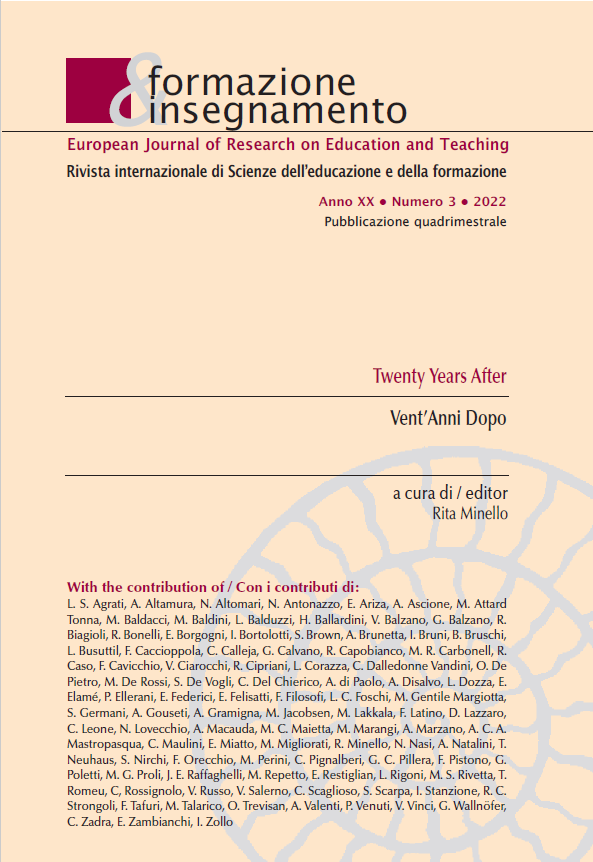Formazione e industria 4.0: pratiche e sfide formative tra tecnologia e consapevolezza (la voce dei formatori)
DOI:
https://doi.org/10.7346/-fei-XX-03-22_42Palavras-chave:
Formazione Continua, Industria 4.0, Tecnologie Educative, Competenze dei Formatori, Pratiche FormativeResumo
Data l’influenza che il fenomeno Industria 4.0 sta avendo sul mondo della scuola e della formazione, è necessario monitorare il suo evolversi al fine di consentire alle istituzioni educative e formative di aggiornare i curriculum e di acquisire nuove tecnologie e prassi formative a supporto delle attività didattiche. Attraverso la raccolta e l’analisi delle testimonianze di un gruppo di 21 formatori della formazione continua italiana, si è tentato di inquadrare e comprendere gli effetti diretti e indiretti dell’Industria 4.0 sui processi formativi, sui metodi, e sui contesti formativi italiani al fine di restituire un set di informazioni utili sia per il mondo della formazione professionale che per il mondo della scuola generalista, in quanto chiamato anch’esso a confrontarsi con questo fenomeno. Le informazioni emerse possono essere utili per ritarare e localizzare i modelli formativi educativi orientati alla digitalizzazione e all’innovazione tecnologica.
Referências
Abele, E., Chryssolouris, G., Sihn, W., Metternich, J., ElMaraghy, H., Seliger, G., Sivard, G., ElMaraghy, W., Hummel, V., Tisch, M., & Seifermann, S. (2017). Learning factories for future oriented research and education in manufacturing. CIRP Annals - Manufacturing Technology, 66(2), 803–826. https://doi.org/10.1016/j.cirp.2017.05.005
Abidi, M. H., Al-Ahmari, A., Ahmad, A., Ameen, W., & Alkhalefah, H. (2019). Assessment of virtual reality-based manufacturing assembly training system. International Journal of Advanced Manufacturing Technology, 105(9), 3743–3759. https://doi.org/10.1007/s00170-019-03801-3
Avis, J. (2018). Socio-technical imaginary of the fourth industrial revolution and its implications for vocational education and training: a literature review. Journal of Vocational Education & Training, 70(3), 1–27. https://doi.org/10.1080/13636820.2018.1498907
Azevedo, A., & Almeida, A. H. (2021). Grasp the challenge of digital transition in smes—a training course geared towards decision-makers. Education Sciences, 11(4), 1–20. https://doi.org/10.3390/educsci11040151
Balocco, V. (2022). Industria 4.0, in Europa aziende ancora ai blocchi di partenza. Costi e tempistiche gli ostacoli sul cammino - CorCom. Retrieved September 30, 2022, from https://www.corrierecomunicazioni.it/industria-4-0/industria-4-0-in-europa-aziende-ancora-ai-blocchi-di-partenza-costi-e-tempistiche-gli-ostacoli-sul-cammino/
Charmaz, K. (2006). Constructing Grounded Theory. A Pratical Guide Through Qualitative Analysis. Sage.
Coban, M., Bolat, Y. I., & Goksu, I. (2022). The potential of immersive virtual reality to enhance learning: A meta-analysis. Educational Research Review, 36, 100452. https://doi.org/10.1016/J.EDUREV.2022.100452
Della Valle, E. (2022). Docenti e formazione: Per un’implementazione sostenibile del digitale. Formazione & insegnamento, 20(1), 868–867. https://doi.org/10.7346/-fei-XX-01-22_77
Glaser, B., Strauss, A., & Strutzel, E. (1968). The discovery of Grounded Theory; strategies for qualitative research. Nursing Research, 17(4), 364.
Koren, I., & Klamma, R. (2018). Enabling visual community learning analytics with Internet of Things devices. Computers in Human Behavior, 89(February), 385–394. https://doi.org/10.1016/j.chb.2018.07.036
Liao, Y., Deschamps, F., Loures, E. de F. R., & Ramos, L. F. P. (2017). Past, present and future of Industry 4.0 - a systematic literature review and research agenda proposal. International Journal of Production Research, 55(12), 3609–3629. https://doi.org/10.1080/00207543.2017.1308576
Moldovan, L. (2019). State-of-the-art Analysis on the Knowledge and Skills Gaps on the Topic of Industry 4.0 and the Requirements for Work-based Learning. Procedia Manufacturing, 32, 294–301. https://doi.org/10.1016/j.promfg.2019.02.217
Perini, M., & Pentassuglia, M. (2018). One Step Forward : Advancing Knowledge on Italian VET-Laboratory In- structional Practices. Trends in Vocational Education and Training Research. Proceedings of the European Conference on Educational Re- Search (ECER), Vocational Education and Training Network (VETNET), September 2015, 289–296. https://doi.org/10.5281/zenodo.1319698
Perini, M., Tommasi, F., & Sartori, R. (2022). Quali competenze e quali strategie formative per l’industria 4.0? Lo stato dell’arte. Qwerty - Open and Interdisciplinary Journal of Technology, Culture and Education, 17(1). https://doi.org/10.30557/QW000039
Pfeiffer, S. (2018). The “future of employment” on the shop floor: Why production jobs are less susceptible to computerization than assumed. International Journal for Research in Vocational Education and Training, 5(3), 208–225. https://doi.org/10.13152/IJRVET.5.3.4
Potti, G. (2021). Industria 4.0, a che punto sono Italia ed Europa: bene le tecnologie ma servono competenze - Agenda Digitale. Retrieved September 30, 2022, from https://www.agendadigitale.eu/industry-4-0/industria-4-0-a-che-punto-sono-italia-ed-europa-bene-le-tecnologie-ma-servono-competenze/
Punie, Y. (Ed.), & Redecker, C. (2018). DigCompEdu. Il quadro di riferimento europeo sulle competenze digitali dei docenti (S. Bocconi, J. Earp, & S. Panesi, It. Trans.). Istituto per le Tecnologie Didattiche,Consiglio Nazionale delle Ricerche (CNR-ITD). https://doi.org/10.17471/54008
Roldán, J. J., Crespo, E., Martín-Barrio, A., Peña-Tapia, E., & Barrientos, A. (2019). A training system for Industry 4.0 operators in complex assemblies based on virtual reality and process mining. Robotics and Computer-Integrated Manufacturing, 59(July 2018), 305–316. https://doi.org/10.1016/j.rcim.2019.05.004
Roll, M. J. J., & Ifenthaler, D. (2021). Multidisciplinary digital competencies of pre-service vocational teachers. Empirical Research in Vocational Education and Training, 13(1). https://doi.org/10.1186/s40461-021-00112-4
Sangmeister, J., Winther, E., Deutscher, V., Bley, S., Kreuzer, C., & Weber, S. (2018). Designing Competence Assessment in VET for a Digital Future. In Digital Workplace Learning (pp. 65–92). Springer International Publishing. https://doi.org/10.1007/978-3-319-46215-8_5
Sità, C. (2012). Indagare l’esperienza. L’intervista fenomenologica nella ricerca educativa. Carocci editore.
Tacconi, G. (2011). La didattica al lavoro. Analisi delle pratiche educative nell’istruzione e formazione professionale. FrancoAngeli.
Tacconi, G., Gomez, G. M., & Perini, M. (2019). Pratiche di progettazione didattica e valutazione degli apprendimenti nei CPIA del Veneto. In G. Tacconi & N. Morbioli (Eds.), Reinventare la Scuola (p. 217). Erickson.
Tommasi, F., Perini, M., & Sartori, R. (2022). Multilevel comprehension for labor market inclusion: a qualitative study on experts’ perspectives on Industry 4.0 competences. Education + Training, 64(2), 177–189. https://doi.org/10.1108/ET-04-2021-0146
Downloads
Publicado
Como Citar
Edição
Seção
Licença
Copyright (c) 2022 Marco Perini

Este trabalho está licenciado sob uma licença Creative Commons Attribution 4.0 International License.
Formazione & insegnamento é distribuído sob a Attribution 4.0 International (CC BY 4.0).
Para obter mais detalhes, consulte nossa Política de Repositório e Arquivamento, bem como nossos Termos de Direitos Autorais e Licenciamento.





